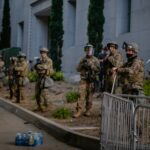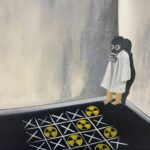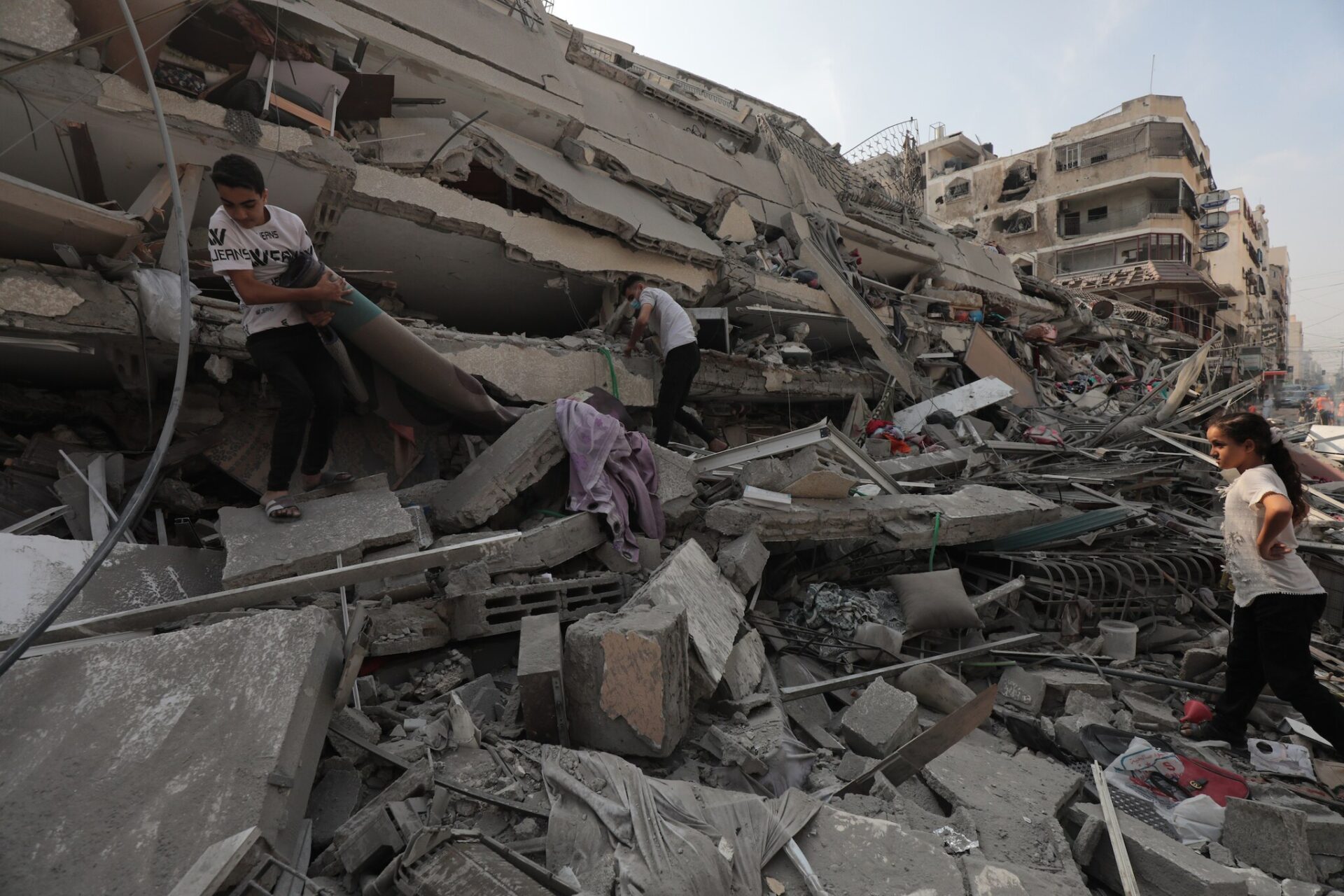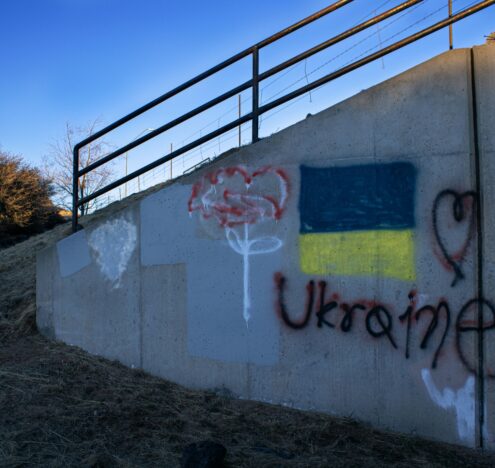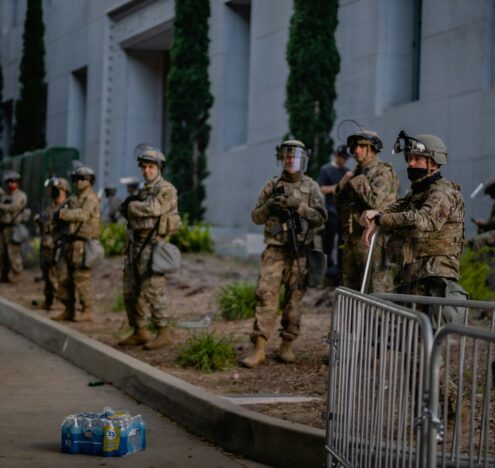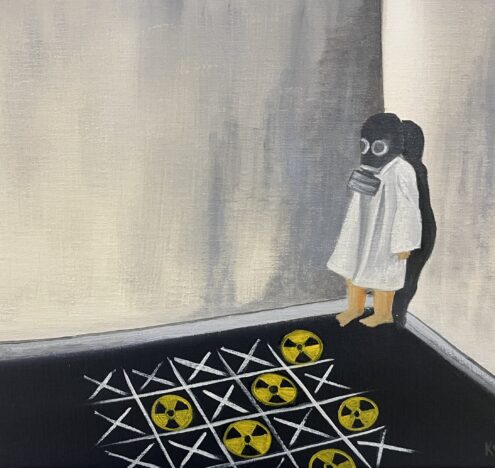A little more than a month into Israel’s war in the Gaza Strip, on Nov. 12, 2023, Hala Abdel-Aty, her grandson Tiem, and other families in their neighborhood faced an unimaginable choice: to flee their home and almost certainly abandon it to destruction, or to stay and face the tanks that had surrounded the area.
Fifty-eight-year-old Hala had to make the decision, the same kind of grim calculation hundreds of thousands of Palestinians in the besieged coastal enclave have had to make since Israel launched its war after a deadly Hamas-led attack on Oct. 7. The last three and a half months have become the longest, most destructive, and most lethal of Israel’s five wars on the Strip since late 2008.
Sarah Khrais, Hala’s 18-year-old daughter, later recounted the onset of the chaos that hit Gaza City that day in early November. “We were startled by screams,” she said. “Refugees from the nearby Suad School sought safety in our homes, fleeing from tanks that had stormed their shelter, firing indiscriminately.”
Hoping for safety or not, she explained, the danger would follow those who fled the Suad School. “[E]ven our home wasn’t safe.”
As the displaced arrived, the area rapidly erupted into a battlefield. Hala’s family, along with others, made the harrowing choice the next morning to join a convoy moving to a supposedly safer location. Hala, a protective matriarch, gathered her family, including her five-year-old grandson Tiem, and led the procession. All while, she held high the universal symbol of truce — a white flag.
As they joined a convoy to escape the tanks, their journey took a tragic turn. Sarah’s voice trembled as she recounted what followed: a staccato of sniper fire shattered the tense silence. “I screamed for my mother, not realizing she was the one shot,” Sarah said, adding: “Our world turned upside down in an instant. We had sought safety, but were met with a sniper’s cold indifference.”
Amid a conflict that has seen a staggering level of human suffering and death, Hala’s slaying represents an even more tragic violation of international law: the targeting of civilians holding white flags, symbols recognized the world over as pleas for mercy and signs of surrender.
As of Jan. 14, the Euro-Med Human Rights Monitor had documented nearly 31,497 people who had been killed or had gone missing. Of that total, more than 12,300 were children, while some 6,471 were women. According to Ramy Abdu, head of Euro-Med, there have been at least 100 instances of Israeli soldiers fatally shooting innocent civilians in circumstances similar to Hala’s. “These victims, carrying white flags or showing signs of surrender, posed no threat,” he said. “Among them were men, women, children, and the elderly.”
Such attacks have not only been carried out by Israeli snipers, Abdu explained. In some cases, machinery like unmanned helicopters fired live ammunition at civilians who exhibited signs of surrender while fleeing. “In addition to the deaths caused by drones, there are tens of victims of Israeli snipers and field executions,” he added.
“I heard multiple shots”
Hala’s son, 22-year-old Muhammed Khrais, recalled the moments leading up to his mother’s death. “A soldier seemed to signal us to proceed,” he said. “I was walking to my mother, and as we moved in front of others, I heard multiple shots by the Israeli sniper on top of the tank.”
In the chaotic moments that followed, he rushed to his mother and found her already dying. She spent her final breaths reciting the Shahada, the Islamic declaration of faith in one God.
“We walked, believing in the promise of safe passage,” he recounted. “However, sniper fire shattered our hopes as we entered the street. … She fell, and time stood still. I was frozen in fear.”
Five-year-old Tiem, clinging to his grandmother’s hand, witnessed the tragedy. In a surge of terror, he fled in the opposite direction, away from Muhammed. “The moment my mom was shot,” Muhammed said, “I was frightened to the point where I didn’t see Tiem at all.”
We walked, believing in the promise of safe passage.
– Muhammed Khrais
In her final moments, Hala’s thoughts were of her grandson’s safety, urging him to run. “Run, Tita [grandson],” she said.
Tiem escaped, eventually fleeing to the southern areas with a family of distant relatives, heading south to Nusirat. They continued onward to Khan Younis, finally ending up in Rafah.
“Sweeping bodies off the road”
The Euro-Med Human Rights Monitor documented another, yet unpublished case of what it describes as the deliberate targeting of civilians attempting to flee. On Dec. 6, Asaad Abu Salah was one of five people who emerged from the relative safety of the Aleppo School, where his family and others had sheltered in the northern Gaza Strip. Outside the school, a bullet struck him down.
Relative Rabaa Abu Salah explained that 65-year-old Saadi Abu Salah, Asaad’s grandfather, then ventured out of the school with a white flag in hand. Still unsure of what had happened to Asaad, Saadi hoped to learn of the boy’s fate. But he met the same fate: a sniper’s bullet killed him. Worse still, snipers then gunned down four of Saadi’s sons: Sorour, Ahmed, Mahmoud, and Youssef.
In Rabaa’s telling, the most heartbreaking moment in a series of deliberate attacks came next. Enshirah Abu Salah, Saadi’s wife, dashed toward her fallen family members only to be shot down too.
More than a month on, Rabaa’s still wracked with grief. And as death compounds across the Strip, she struggled as much in the aftermath as she did the day she witnessed her relatives shot and killed. She said she and others saw “the Israeli bulldozer callously sweeping the bodies off the road, burying them beneath debris – a scene that remained untouched for over 20 days.”
“Definitely not a mistake”
For Hala’s family, the chaos that followed only worsened their grief, and the time before the war serves as a cruel reminder of what could have been. On the first day of the war, Muhammed said, he “was about to propose to the girl I loved, a moment to bring joy to my mother.”
Throughout the war, bombings and other attacks have cut families in half, while others erased entire families from Gaza’s population registry.
Muhammed said that he eventually reunited with Tiem, but he and other relatives know that witnessing his grandmother’s killing and being separated from his parents will leave the boy with lifelong emotional scars. It’s as much a testament to the human cost of conflict that continues to tear apart families as it is a microcosm of the despair and resilience throughout Gaza.
The family sees Hala’s final act as one of selfless love — a grandmother protecting her grandchild in her last moment.
Israeli officials have repeatedly denied that its forces have intentionally targeted civilians, but rights groups have time and again sounded the alarm on what they describe as war crimes.
But to Muhammed, there is no question the sniper who shot and killed his mother did so on purpose. “It was obvious she was elderly, with a child, and holding a white flag,” he said. “My mother was left with a large [bullet wound] above her heart. That is definitely not a mistake.”









